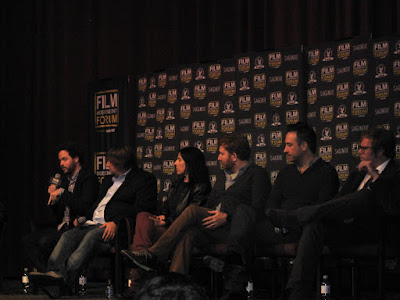"Like Crazy," (best film website I've seen) best picture pic at Sundance opened the event one week before it opened limited release. A Q & A with the creative team followed the screening.
A beautiful film about love, Film Independent introduced Like Crazy as an "artist driven" film. I had never thought of a film in those specific terms, but I see Film Independent likes to support films that are artist driven.
I loved it. It's funny because when I think about it I feel like it's not really about anything. You know how that is? It's the same with "Drive," (which I also loved). You go to say what it's about and your description falls short. "It's about a guy that drives...." Or "It's about first love..." It's the same feeling when you have a great connection with someone new. A friend asks, "What did you talk about?" And you say, "nothing really" or "everything" because you just talked a lot and it was about nothing in particular? ... Maybe that's how it is with great art and love too...indescribable in words; it's more about a feeling, fresh. Not to mention "Drive" and "Like Crazy" both have especially fantastic cinematography.

The fresh feeling "Like Crazy" brings is a result of a few nontraditional filmmaking methods, the most significant being what director Drake Doremus describes as "Hybrid/Improv." The actors came into a script and outline heavy on exposition, back-story, and subtext, but lacking in dialog compared to most films. Much of the dialog was improvised. Doremus and crew couldn't emphasize enough how extensive their outlining process is. He and co-writer Ben York Jones start with exposition
then strip it down and down, taking out as much dialog as possible. By the time the actors come in they just bring characters. With a structure and outline so heavy on detail there's room to "breathe within the structure." Many traditional filmmakers may see this approach as risky. But as was said on stage during the Q&A: "If you don't push yourself to fail, you stagnate."

The idea of creating as real of a situation as possible also went into the cinematography and camera choice. An unobtrusive, low profile 7D disappeared into the scene. "It's a process of trying to get the actors to forget about the camera and forget they're acting." DP John Gulesarian said Doremus' process means the whole thing is approached a bit like a documentary. Since the actors are imrpovising, he shoots everything, rather than sticking to a strict shot list. He doesn't know where they will go next. There were 70 hours of footage in the end, which "was a really fun process because you're constantly rewriting the film."
Doremus also employs method acting. The lovers in "Like Crazy" shared a living situation for a month. This whole filmmaking technique in my mind is brilliant. The actors are thrilled because they are empowered: they don't get this experience anywhere
else. They get to push themselves. Simple enough: great work and brilliant performances come from happy, passionate, empowered team members.
It's interesting to think that this improv approach, which if I'm not mistaken was first popularized by Mike Leigh (though Leigh uses improv even more extensively), may be gaining more and more power. Two weeks ago the first director I met at Shriekfest, Micah Levin, (same age group as Doremus, 25-30) used the same approach for his first feature "Opus." Since the internet and a digital culture means that everyone is a filmmaker, and since we watch all the content in the same place, our personal computer, the lines between what are fancy theatre films and home movies are blurred. Reality and documentary have a larger influence on "film" than right now than ever before.
"Like Crazy" is not dialog heavy, it's more emotional, and very visual (same with "Drive"...) which makes sense because when Doremus and Jones decided to write a movie together they agreed first on tone, and the kind of movie more than anything. During the film's conception they traded music, music videos, and other visuals back and forth. Okay, I'll stop comparing it to "Drive", in just a minute, but I watched an interview with Ryan Gosling about his first meeting with Director Nicolas Winding Refn: Gosling picked up Refn from the airport one night in LA and put on music in the car. As they cruised the freeways listening to music, Refn started crying because he realized the movie at that time.

At the end of the panel, the Like Crazy creative team said what theme they most take away from the film, in 140 characters or less (Oh, Twitter). "Love matters," said Doremus. "Love is important and love matters and it's worth loving all your life."
"The first love is the most real in a lot of ways," said producer Andrea Sperling.
Jones agreed with everything that was said prior, then took a different stance. "The wonder that is nostalgia- how memories are precious things..."
*This review is also posted on my movie blog at fest21.






